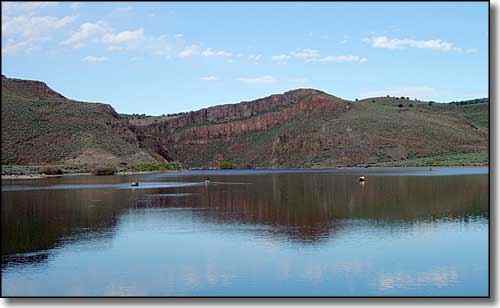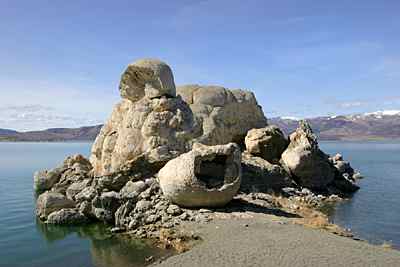Nevada bighorn sheep moving to Utah

by Nevada Department of Wildlife
11-8-2013
Website
Utah's bighorn sheep herds are about to get new neighbors, and they will be coming from Southern Nevada. Biologists from the Nevada Department of Wildlife (NDOW) and the Utah Division of Wildlife Resources are teaming up to capture as many as 50 sheep from the Muddy and Black mountain ranges northeast of Las Vegas. Biologists plan to release those animals in the Glen Canyon National Recreation Area.
This capture operation is scheduled for Monday and Tuesday, Nov. 4 and 5, and will be the second such capture and release in as many years. In October 2012, the two agencies trapped 50 Nevada sheep from the River and Muddy mountain herds, which were then released in the Grand Staircase-Escalante National Monument.
"This is an opportunity for us to assist Utah in their efforts to restore desert bighorn sheep to historic habitats where herds were extirpated or killed off over a century ago," said Mike Cox, state big game biologist for NDOW. "It will also help us reduce the Muddy Mountain sheep population to a level consistent with available water sources."
Since it first began in 1967, Nevada's trapping and translocation program has enabled NDOW to reestablish bighorn sheep populations in much of its historic range. Moreover, the overall sheep population has grown from about 3,000 animals to more than 11,000 during that time frame.
Pat Cummings, big game biologist for Southern Nevada, said, "Projects like this are indicative of the cooperative relationship between western state wildlife agencies and our ability to work together for the overall conservation of species like the desert bighorn."
NDOW plans to trap an additional 35 to 50 sheep in the Bare Mountains near Beatty. Those sheep will be translocated to the Excelsior Mountains in Esmeralda County and the Candelaria Hills on the Esmeralda and Mineral County line.
In addition to the capture and translocation projects, NDOW will be testing sheep herds in the Eldorado, McCullough and Spring mountain ranges to determine whether sheep in these areas have been exposed to Mycoplasma ovipneumoniae. This is the pathogen associated with the pneumonia outbreak in the River Mountains.
"Our goal is to see if we can establish a boundary between the affected and unaffected sheep, and where we believe there are affected sheep, determine the cause of poor herd performance," said Peregrine Wolff, the state wildlife veterinarian. "Our plan is to test 10 sheep from each of the three mountain ranges. This will primarily be live sampling with collection of blood, and nasal and oral swabs."
The Nevada Department of Wildlife (NDOW) protects, restores and manages fish and wildlife, and promotes fishing, hunting, and boating safety. NDOW's wildlife and habitat conservation efforts are primarily funded by sportsmen's license and conservation fees and a federal surcharge on hunting and fishing gear. Support wildlife and habitat conservation in Nevada by purchasing a hunting, fishing, or combination license. For more information, visit www.ndow.org.
This capture operation is scheduled for Monday and Tuesday, Nov. 4 and 5, and will be the second such capture and release in as many years. In October 2012, the two agencies trapped 50 Nevada sheep from the River and Muddy mountain herds, which were then released in the Grand Staircase-Escalante National Monument.
"This is an opportunity for us to assist Utah in their efforts to restore desert bighorn sheep to historic habitats where herds were extirpated or killed off over a century ago," said Mike Cox, state big game biologist for NDOW. "It will also help us reduce the Muddy Mountain sheep population to a level consistent with available water sources."
Since it first began in 1967, Nevada's trapping and translocation program has enabled NDOW to reestablish bighorn sheep populations in much of its historic range. Moreover, the overall sheep population has grown from about 3,000 animals to more than 11,000 during that time frame.
Pat Cummings, big game biologist for Southern Nevada, said, "Projects like this are indicative of the cooperative relationship between western state wildlife agencies and our ability to work together for the overall conservation of species like the desert bighorn."
NDOW plans to trap an additional 35 to 50 sheep in the Bare Mountains near Beatty. Those sheep will be translocated to the Excelsior Mountains in Esmeralda County and the Candelaria Hills on the Esmeralda and Mineral County line.
In addition to the capture and translocation projects, NDOW will be testing sheep herds in the Eldorado, McCullough and Spring mountain ranges to determine whether sheep in these areas have been exposed to Mycoplasma ovipneumoniae. This is the pathogen associated with the pneumonia outbreak in the River Mountains.
"Our goal is to see if we can establish a boundary between the affected and unaffected sheep, and where we believe there are affected sheep, determine the cause of poor herd performance," said Peregrine Wolff, the state wildlife veterinarian. "Our plan is to test 10 sheep from each of the three mountain ranges. This will primarily be live sampling with collection of blood, and nasal and oral swabs."
The Nevada Department of Wildlife (NDOW) protects, restores and manages fish and wildlife, and promotes fishing, hunting, and boating safety. NDOW's wildlife and habitat conservation efforts are primarily funded by sportsmen's license and conservation fees and a federal surcharge on hunting and fishing gear. Support wildlife and habitat conservation in Nevada by purchasing a hunting, fishing, or combination license. For more information, visit www.ndow.org.
More Reports
Nevada Department of Wildlife Reports
for Thursday, November 7th, 2013
Lake Mead: Fishing at Lake Mead has not been good
Lake Mohave: The Striper bite is fair but some nice fish have been caught. Bass fishing is good
Colorado River - Laughlin: Catfish & Stripers are being caught at the Colorado River in Laughlin
Las Vegas Urban Ponds: NDOW will begin its annual rainbow trout stocking schedule this week at the urban ponds
Kirch Wildlife Management Area: Trout fishing has picked up at Haymeadow and Cold Springs reservoirs
Eagle Valley Reservoir: Fishing at Eagle Valley Reservoir remains good following the fall trout plants
Echo Canyon Reservoir: Anglers are finding good trout fishing at Echo Canyon Reservoir & little fishing pressure
Nevada Department of Wildlife Reports
for Friday, November 1st, 2013
Lake Mead: Striper bite has slowed at Lake Mead, Laremouths & smallmouth bass are hitting plastics & crankbaits
Lake Mohave: Striper bite has been light at Lake Mohave, but the action for smallmouth & largemouth is good
Colorado River - Laughlin: Trout & Striper action on the Colorado River near Laughlin has been good
Las Vegas Urban Ponds: Fishing at the Las Vegas Urban Ponds is slowing, no word yet on trout plants
Kirch Wildlife Management Area: Trout fishing has picked up at Haymeadow and Cold Springs
Eagle Valley Reservoir: Brown trout were planted at Eagle Valley Reservoir last week
Echo Canyon Reservoir: Rainbow Trout were planted at Echo Valley Reservoir last week
